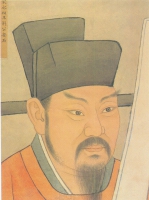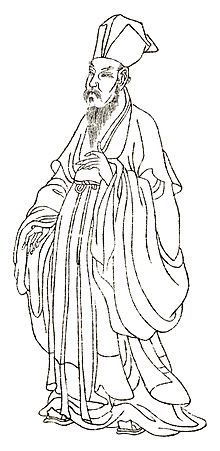| 姓: | 王 | ||
| 名: | 安石 | ||
| 字: | 介甫 | ||
| 网笔号: | 半山; 荆国公; 王文公; 王荆公 | ||
| 籍贯: | 临川盐阜岭 | ||
| 今属: | 江西省抚州市临川县 | ||
阅读王安石 Wang Anshi在诗海的作品!!! | |||
王安石(1021年12月18日-1086年5月21日),字介甫,[a]号半山,临川盐阜岭(今江西省抚州市临川县)人,北宋著名政治家、文学家、思想家,实官至司空、尚书左仆射、观文殿大学士、镇南军节度使,封荆国公。身后追赠为太傅,谥曰文。因而被世人称之为“王荆公”、“王文公”。
王安石文思敏捷,被后世称为唐宋八大家之一。除文学造诣外,王安石对传统经学也有研究,创立了在当时具有卓越影响力的学派——荆公新学,他的思想对宋明之季的经学学习产生了极大的影响,在当时也获得了很多关注。虽然王安石主要修习儒家学说,但是他秉持实务主义,从周礼、荀子、韩非子和商君书(商子)等其他经籍、论著中吸取经验,后世学界多因此结合王安石所主持的熙宁变法而认为王安石传承于法家。除此之外,王安石对道教、佛教也有了解,并留有多篇著述。欧阳修曾作诗“翰林风月三千首,吏部文章二百年。老去自怜心尚在,后来谁与子争先”称赞王安石。现有《临川集》、《临川集拾遗》等文集存世。
王安石在政治一途颇有所建树,对宋代产生了深远的影响。他在庆历二年考中进士,先后于江苏、浙江、安徽、河南等地为官,这二十年中他广泛地接触了社会生活,对社会上的各种问题有了比较深刻的认识。直至熙宁年间担任宰相后发动改革,史称“熙宁变法”或“王安石变法”。王安石的基本思想根植于不盲从一定的权威、不信奉一成不变的教条,进行改革时对现实有清醒的认识,以及正确的技术与计算。希望将“财政税收大规模的商业化”。熙宁变法引起了朝廷内部新派与保守派之间的激烈冲突,史称“新旧党争”,最终在各种原因的阻隔下王安石所实施的变法基本失败。此次变法在历史上多被评价为立意良善但王安石本人能力不足而失败,宋史学家漆侠提出变法成功和失败的地方都值得垂鉴后世。
宋政治家、文学家。字介甫,晚号半山。抚州临川(今属江西)人,后移居江陵(今南京)。其政治上主张“改易更革”,进行变法,后遭失败。安石为宋诗文革新运动的中坚人物,为唐宋古文八大家之一。诗成就最高,今存一千五百三十余首。多指陈现实,有感而发。如《河北民》、《秃山》等。咏史之作,往往寓意深刻,如《商鞅》、《贾生》等。《明妃曲》二首,立意新颖,尤负盛名。退隐后,诗歌转为山光水色,其雄直峭劲、壮丽超逸而又深婉不迫的独特诗风,为推动宋诗革新起了积极作用。文存千余篇,其议论性散文尤具特色如《答司马谏议书》、《游褒禅山记》等。其词格调高峻,最为绝唱。有《临川集》一百卷传世。生平事迹见《宋史》卷三二七集。[王安石]
王安石(1021—1086)字介甫,晚号半山,临川(今属江西)人,庆历二年(1042)
进士。在仁宗、英宗两朝,他在许多地方担任过地方官,也曾在中央部门任职,对于民
间情况、政治的弊病和国家所面临的危机有相当的了解,逐渐形成自己的一套政治、经
济主张,并曾在给仁宗皇帝的上书中提出变法的建议。神宗即位后,面对外族压迫、国
力虚弱、财用匮乏等一系列严重问题,急欲找到出路,遂于熙宁二年(1069)起用时任
三司度支判官的王安石为参知政事,主持历史上著名的熙宁变法。但他的一套激烈变革
的政策措施,既触犯了士大夫集团以及富商豪绅的利益,又与封建官僚制度不相适应,
造成很多流弊,招致强有力的反对,几起几落。后期退居江宁。在司马光全面废除新法
后不久,忧愤而卒。有《临川集》。
王安石青年时代就有高度的政治热情,以太平宰相自许,后又以顽强的态度投入政
治斗争,其理想决不是要做一个“文人”。在他三十多岁会见欧阳修时,欧阳修在赠诗
中比之为李白、韩愈这样的文学家,他在酬答诗中却说:“他日若能窥孟子,终身何敢
望韩公?”(《苕溪渔隐丛话》引《漫叟诗话》)在他看来,韩愈还是文人气太重。他
对文学的看法,也是特别强调其实用功能:
所谓文者,务为有补于世而已矣;所谓辞者,犹器之有刻镂绘画也。诚使巧且华,
不必适用;诚使适用,亦不必巧且华。要之,以适用为本,以刻镂绘画为之容而已。
(《上人书》)
这种观点同当时文学思想的主潮相一致。不过,王安石说的“适用”,偏重在具体
实际的社会作用方面,而不像道学家偏重在道德说教,这是政治家的本色。
由于这种“务为有补于世”的文学观念的支配和对现实的强烈关注,王安石的诗文
都与社会、政治或人生的实际问题贴得很紧。散文尤其突出。像《上仁宗皇帝言事书》、
《答司马谏议书》等名文,本是与变法有关的政论而非文学作品,且不像欧阳修同类文
章那样讲究文采,暂且不论,即使像《读孟尝君传》、《书刺客传后》、《伤仲永》这
样的小品文,都包涵有很实际的用意,而不是为了表现人生情趣、文学才思。
如《读孟尝君传》谈的是怎样才算真正“得士”的问题,《伤仲永》谈的是天赋不
可依恃,学习尤其重要。甚至像《游褒禅山记》这种历来重视辞采和情趣的游记类散文,
也用了近半的篇幅,引伸讨论一个哲理性的问题:无论做什么事情,要达到超乎庸常的
境界,都需要具有非凡的意志、付出超常的努力。
在王安石诗歌中,也存在类似的情况。一部分作品是直接反映现实社会问题的,如
《感事》、《兼并》、《省兵》、《收盐》、《河北民》等,大多作于他任地方官时,
表达了他对时政的批评和他的政治理想。另一部分作品,则借古喻今,或借题发挥,表
明作者的政治观念或人生观念,如《商鞅》,以“今人未可非商鞅,商鞅能令政必行”,
强调了建立有效的国家机器的重要;《孟子》“何妨举世嫌迂阔,故有斯人慰寂寥”,
表现了他在政治上固执己见的态度。此外如《贾生》、《汉武帝》、《桃源行》、《明
妃曲》等,大体类似。不过,同散文的情况不一样的是,除了这一类观念性比较强的作
品以外,王安石(特别是在他脱离政治舞台的时期)还写有许多偏重于抒情的作品。
与梅尧臣、苏舜钦、欧阳修等人推崇和效仿韩愈不同,王安石诗受韩愈的影响很少,
而是非常敬重杜甫,并广泛吸收了中晚唐诗的特长。他曾编过《老杜诗后集》,并在
《杜甫画像》中写道:“吾观少陵诗,为与元气侔,力能排天斡九地,壮颜毅色不可
求。”杜甫在宋代逐渐受到高度重视,宋诗逐渐向杜甫的方向靠拢,可以说是以王安石
为起点的。另外,他也编过《唐百家诗选》,收的多是不为人重视的中小诗人的作品,
显然他有广采博收的意识。在此基础上,他的诗形成了以语言精炼而圆熟、意境清丽而
含蓄为主要特点的风格。
王安石的诗对语言的锤炼十分讲究,并善于不留痕迹地化用前人的词汇和意象。传
说《泊船瓜洲》中“春风又绿江南岸”一句中的“绿”字,改了十几次才确定下来。其
实,把形容词“绿”用为动词的写法,不但李白早已有“东风已绿瀛洲草”之句(《侍
从宜春苑……》),其他人也反复使用过多次,但王安石这句最为亲切自然而形象鲜明,
能表现出江南风光的喜人之处,所以为人们所熟知。又如《暮春》诗中“雨花红半堕,
烟树碧相依”,是受杜甫“晓看红湿处,花重锦官城”(《春夜喜雨》)一联的启发,
但并不觉得是套用前人的。还有《书湖阴先生壁》“一水护田将绿绕,两山排闼送青
来”,后人认为是用史书中的材料为对仗,极表赞赏,但他确实用得很巧,不显得吃力。
另一方面,王安石虽然经常凭藉广博的书本知识方便地化用前人语汇,但他并不总是在
搬弄学问,他也常常通过细腻的观察,捕捉生动的意象,以平易的语言表现自己内心的
情绪、感受。像“北山输绿涨横陂,直堑回塘滟滟时。细数落花因坐久,缓寻芳草得归
迟”(《北山》),后二句对得很工整,读起来却很自然,“细数”、“缓寻”既烘托
了萧散旷逸、从容不迫的神态,又暗涵了一种百般无聊的闲愁。一般来说,王安石不把
经过仔细揣摩、推敲的个别典故、语词用得很显眼,而是把这种精巧的语言同全诗意脉
的自然流动融合成一体,正如叶梦得《石林诗话》所说,看上去“见舒闲容与之态”,
但“字字细考之,若经櫽括权衡者,其用意亦深刻矣”。
王安石诗常有谢灵运及中晚唐诗那种清丽的风致,黄庭坚谓之“雅丽精绝,脱去流
俗”(《苕溪渔隐丛话》引)。像《岁晚》:
月映林塘澹,风涵笑语凉。俯窥怜绿净,小立伫幽香。携幼寻新菂,扶衰坐野航。
延缘久未已,岁晚惜流光。
诗中的景物显得清幽雅洁,呈现超脱于世俗之外的美,而诗人的心便流连于此。读
这样诗,我们会想到谢灵运的山水诗,但王安石没有他那样的贵族式的孤傲;想到大历
十才子或贾岛一派的写景诗,但王安石没有他们那种寒苦。实际上,王安石这一类诗是
带有某种孤独和清高意味的,只是他对此不愿作强化的表现,保持着心态的平衡,因而
在语言上,这一类诗也写得比较谐调。
这里已经涉及王安石诗的另一特点,即表现的含蓄。为了更好地说明它,我们再举
一个例子:
杖藜缘堑复穿桥,谁与高秋共寂寥?伫立东岗一搔首,冷云衰草暮迢迢。(《寄蔡
天启》)
杜甫晚年的诗,常把自我的形象孤零零地置于肃杀的秋色中(如《登高》),以表
现心境的悲凉,王安石这首诗与之有些相像,包括声律的顿挫也有些相似。但王安石作
了些淡化的处理,譬如诗中用“谁”来代替自己,避免以广阔的背景造成情绪的扩张,
同时也回避说明或暗示情绪的具体内涵,因而留给人们的是一种既萧索又苍凉、不可实
指的怅惆情怀。造成这种诗境原因很多。一方面,王安石个性倔强,一生历经风波,在
受到挫折时,内心的不平总是要流露出来;但另一方面,不仅他的人生体验很复杂,不
易说清楚,而且,在宋代重理智的文化氛围中,作为有过重要政治地位的大人物,诗中
个人情感表现得过于强烈,会被认为是一种幼稚的夸张,所以他还是用了比较抑制的、
含蓄蕴藉的方式来表现。另外像《南浦》:“南浦随花去,回舟路已迷。暗香无觅处,
日落画桥西。”也是一种不知因何而起的惘然若失的情怀。但不管怎么说,在宋代诗人
中,王安石的诗歌情感,已经是比较浓厚而不偏向于平淡的了。透过清丽而含蓄的意境,
诗人的内心隐痛还是可以感受到的。
王安石以其广博的学识、圆熟的语言技巧、自然含蓄而又精巧凝炼的风格,建立了
宋诗的一体,后来以黄庭坚为首的江西诗派,受他的影响不小。他们以才学为诗的偏向,
也与王安石有些关系。
(中国文学史,章培恒 骆玉明,youth扫校)
Wang Anshi [wǎŋ ánʂɨ̌]; Chinese: 王安石; December 8, 1021 – May 21, 1086), courtesy name Jiefu (Chinese: 介甫), was a Chinese politician, poet and prose writer during the Song dynasty. He served as chancellor who attempted major and controversial socioeconomic reforms known as the New Policies. These reforms constituted the core concepts of the Song-Dynasty Reformists, in contrast to their rivals, the Conservatives, led by the Chancellor Sima Guang.
Wang Anshi's ideas are usually analyzed in terms of the influence the Rites of Zhou or Legalism had on him. His economic reforms included increase currency circulation, breaking up of private monopolies, and early forms of government regulation and social welfare. His military reforms expanded the use of local militias and his government reforms expanded the civil service examination system and attempted to suppress nepotism in government. Although successful for a while, he eventually fell out of favor of the emperor.
Background
During the Song Dynasty, the unprecedented development of large estates, whose owners managed to evade paying their share of taxes, resulted in an increasingly heavy burden of taxation on commoners. The drop in state revenues, a succession of budget deficits, and widespread inflation prompted the Emperor Shenzong of Song to seek advice from Wang.
Early career
Wang Anshi came from a family of imperial scholars (進士 Jìnshì) and was placed fourth in the imperial exam of 1042. He spent the first twenty years of his career in the regional government of the lower Yangtze region. During this period, he gained practical experience in local governance. This experience guided his analysis in formulating solutions to revitalize the ailing Song society.
Major reform
Wang believed that the state has the responsibility to provide for its people the essentials for a decent living standard: "The state should take the entire management of commerce, industry, and agriculture into its own hands, with a view to succoring the working classes and preventing them from being ground into the dust by the rich."
Wang came to power as 2nd privy councilor in 1069. It was there that he introduced and promulgated his reform policy (xin fa 新法). There were three main components to this policy: 1) state finance and trade, 2) defense and social order, and 3) education and improving of governance. Some of the finance reforms included paying cash for labor in place of corvee labor, increase the supply of copper coins, improve management of trade, direct government loan to farmers during planting seasons and to be repaid at harvest. He believed that foundation of the state rests on the well being of the common people. To limit speculation and eliminate private monopolies, he initiated price control and regulated wages and set up pensions for the aged and unemployed. The state also began to institute public orphanages, hospitals, dispensaries, hospices, cemeteries, and reserve granaries.
The military reform centered on a new institution of the baojia system or organized households. This was done to ensure collective responsibility in society and was later used to strengthen local defense. He also proposed the creation of systems to breed military horses, the more efficient manufacture of weapons and training of the militia.
To improve education and government, he sought to break down the barrier between clerical and official careers as well as improving their supervision to prevent connections being used for personal gain. Tests in law, military affairs and medicine were added to the examination system, with mathematics added in 1104. The National Academy was transformed into a real school rather than simply a holding place for officials waiting for appointments. However, there was deep-seated resistance to the education reforms as it hurt bureaucrats coming in under the old system.
Wang’s downfall
Although Wang had the alliance of such prominent court figures as Shen Kuo, imperial scholar-officials such as Su Dongpo and Ouyang Xiu bitterly opposed these reforms on the grounds of tradition. They believed Wang's reforms were against the moral fundamentals of the Two Emperors and would therefore prevent the Song from experiencing the prosperity and peace of the ancients. The tide tilted in favor of the conservatives due to renewed foreign conflict. He was even temporarily removed from power and imprisoned in 1075.[citation needed]
Like many Chinese officials of the era, Wang's career experienced many reversals, but the beginning of the end came in 1074. A famine in northern China drove many farmers off their lands. Their circumstances were made worse by the debts they had incurred from the seasonal loans granted under Wang’s reform initiatives. Local officials insisted on collecting on the loans as the farmers were leaving their land. This crisis was depicted as being Wang’s fault. The empress dowager was also an opponent of Wang. Wang wanted to resign, but the emperor still supported him, giving him high honors and an appointment to Jiangning (present-day Nanjing.)
He was recalled by the emperor the following year, but now he was seen as vulnerable and was openly attacked from groups of conservatives. Wang returned to Nanjing, which he preferred to Kaifeng. He wrote and engaged in scholarship through to his death in 1086.
With Shenzong's death in 1085, Wang was ousted and the New Policies were rolled back - some temporarily, some permanently.
Poet
In addition to his political achievements, Wang Anshi was a noted poet. He wrote poems in the shi form, modeled on those of Du Fu. He was later ranked number seven among the Eight Great Prose Masters of the Tang and Song (唐宋八大家). He was an adherent of the Classical Prose Movement championed by Han Yu and Liu Zongyuan, first and second of the Eight Masters of the Tang and Song respectively. His poetry often included social themes along with the traditional observations of nature.
Poems
A well-known man-of-letters, Wang Anshi produced many outstanding essays and poems. Lines from one of his most famous pieces:
春风又绿江南岸, | Green in the spring winds |
One of eight famous literati of Tang-Song period, Wang Anshi was known for writing with succinctness and profundity. He laid stress on literature's social function and that writings should serve a purpose. His essays "A Visit to Baochan Mountain" and "In Reply to Official Censor Sima's Letter" are widely read by posterity.
Legacy
Chinese politicians and historians have continued to look back on the reforms of Wang Anshi as either principled and measured or misguided and disastrous.
The twentieth-century Chinese warlord Yan Xishan cited the reforms of Wang Anshi to justify his use of a limited form of local democracy in Shanxi. Yan believed that the focus and intent of Wang's reforms was to strengthen the Song dynasty by persuading ordinary Chinese to give the dynasty their active support, instead of merely serving it. The system of "democratic" government that Yan justified via the philosophy of Wang Anshi was mostly focused on improving Yan's own popularity without holding any real power, and never became an effective alternative to military dictatorship. On the other hand, the popular scholar Lin Yutang cast Wang as the equivalent of communist totalitarian government in his biography of Wang's adversary Su Dongpo.
See also
- ^ hence referred to as Wáng Jīnggōng 王荊公
- ^ hence referred to as Wáng Wéngōng 王文公
- ^ D.B. Boulger (1881). History of China. pp. 388–.
- ^ Man and the universe. Japan. Siberia. China. Carmelite House. 1907. pp. 771–.
- ^ Patricia Buckley Ebrey, Paul Jakov Smith 2016 p.237. State Power in China, 900-1325. https://books.google.com/books?id=9SpADAAAQBAJ&pg=PA237
- ^ Mote ch. 6
- ^ Nourse, Mary A. 1944. A Short History of the Chinese, 3rd edition. P.136
- ^ "Wang Anshi | Chinese author and political reformer | Britannica.com". britannica.com. Retrieved 2015-10-23.
- ^ Mote p. 139
- ^ "Ethics of China 7 BC To 1279 by Sanderson Beck | Song Dynasty Renaissance 960-1279". san.beck.org. Retrieved 2015-10-23.
- ^ Mote p. 140
- ^ Mote p. 141
- ^ Mote p. 141-42
- ^ Jaroslav Průšek and Zbigniew Słupski, eds., Dictionary of Oriental Literatures: East Asia (Charles Tuttle, 1978): 192.
- ^ Gillin 42
- ^ Yutang Lin. Gay Genius: The Life and Times of Su Tungpo. New York: John Day, 1947; rpr. Hesperides 2008 ISBN 978-1-4437-2217-9.
Works cited
- Mote, F.W. (1999). Imperial China: 900-1800. Harvard University Press. pp. 122, 138–142.
- Gillin, Donald G. Warlord: Yen Hsi-shan in Shansi Province 1911–1949. Princeton, New Jersey: Princeton University Press. 1967. LCCN 66-14308
Further reading
- Anderson, Gregory E., To Change China: A Tale of Three Reformers", Asia Pacific: Perspectives, 1:1 (2001).


